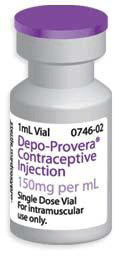
The contraceptive injection, also known as "the shot", contains progesterone or a combination of oestrogen and progesterone. The injectable contraceptives depot med Roxy progesterone acetate (DMPA) and norethisterone enanthate (NET-EN) each contains a progestin like the natural hormone progesterone in a woman's body. In contrast, monthly injectable contains both oestrogen and progestin. Note that combined injectable is not addressed in this module.
Progestin-only injectable contraceptives contain no oestrogen. Therefore, they can be used throughout breastfeeding and by women who cannot use methods with oestrogen. They work primarily by preventing the release of eggs from the ovaries (ovulation).
How effective are progestin-only injectables (DMPA):
Effectiveness depends on getting injections regularly: Risk of pregnancy is greatest when a woman misses an injection. As commonly used, about three pregnancies per 100 women using progestin-only injectable over the first year. This means that 97 of every 100 women using injectable will not become pregnant. When women have injections on time, less than one pregnancy per 100


Advantages of DMPA:
Disadvantages of DMPA:
Who can use progestin-only injectables?:
Women of any reproductive age or parity including women who:Who can not use progestin-only injectables?:
Women who have the following conditions:
Management of side-effects and problems of injectable contraceptives:
DMPA cannot be given to all women. In particular, it is not recommended for pregnant women, or those with breast cancer, or where a client has a history of diabetes (increased blood glucose level), advanced heart or liver disease, severe hypertension (increased blood pressure), or frequent severe headaches.
If a woman comes to you with concerns associated with this injection, do not underestimate or ignore her. Reassure her that the side-effects are not dangerous. Remember that counselling after side-effects has occurred is still useful, but not best practice. The best time to counsel a client about side-effects is when they make their contraceptive method choice. This is because many women encountering side-effects may not come to you at all, so it is important that you have given them the information beforehand.
First, you should advise her to wait until the effective days of the injection have passed. Then, if she is concerned about not having her monthly period, for example, she may want to change to another method. With irregular bleeding, reassure her that it is not harmful and usually reduces or stops after the first few months of use. On the other hand, if the bleeding is profuse and continuous, you should refer her for further investigation and management at the health post or hospital, as there may be another cause.
If she is suffering from headaches, suggest she takes Aspirin (500 mg), Ibuprofen (400 mg) or Paracetamol (500 mg), as needed, and provide her with the pain killer of her choice. Be aware that Aspirin and Ibuprofen may not be tolerated by a woman with gastritis or peptic ulcer diseases. In general, if her condition is severe, or if she is unhappy with your advice, refer her to the nearest health centre or hospital.
Timing and techniques for DMPA injections:
When to start DMPA injections:
Injectable hormonal contraceptives are different from other injections because they are administered using deep intramuscular injection techniques. The vial must be shaken strongly before it is drawn into the syringe, to ensure the active ingredient is in suspension and not in the bottom of the vial. Following the procedure, the injection site should not be massaged or pressurised, because this may accelerate absorption of the drug. Infection prevention procedures are critical.
Reinjection schedule:
When the client comes to you to have her next or subsequent injection, you should check your records to see when you last gave her an injection. If it is the correct appointment date, give her the injection. If she comes to you up to two weeks before her appointment or up to one month after her scheduled appointment, you can still give her the injection. But if she is more than one month late, she can get another injection that day only if you can be sure that she is not pregnant.
She is unlikely to be pregnant if: